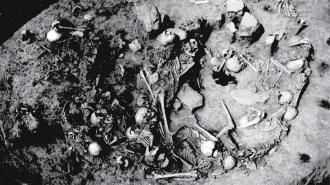A new look at living people’s DNA reveals that the human genome just isn’t what it was in Neolithic times.
Most of the genetic quirks people carry today popped up within the last 5,000 years or so, researchers report online November 28 in Nature. Human populations exploded from no more than a few million to 7 billion, thanks largely to the rise of agriculture.
Researchers examined more than 15,000 genes in each of 6,515 people of European-American or African-American ancestry, looking for genetic variants. Previously, the team reported finding a plethora of rare genetic variants in a smaller sample. Now, the researchers have been able to date when most of the variants arose.
Of the 709,816 genetic variants found in European-Americans in the study, more than 81 percent arose in the past 5,000 years, the researchers determined. African-Americans in the study collectively carried 643,128 genetic variants, more than 58 percent of which are less than 5,000 years old. That may seem like a long time, but it’s only about 5 percent of the time humans have existed in modern form, says study coauthor Joshua Akey, a geneticist at the University of Washington in Seattle.
Although the human population explosion has been obvious from a demographer’s point of view, that growth has been all but invisible to geneticists studying common genetic variants. It takes time for a genetic variant, if it’s not discarded, to rise to prominence. Common variants — those found in 5 percent or more of the population — tend to be old tweaks that have stuck around, usually because they usually don’t have a big effect on health.
The new study will give scientists a clear picture of the stamp the recent population explosion has left on human genes, says Sarah Tishkoff, a geneticist at the University of Pennsylvania in Philadelphia. The work may help track down variants that affect people’s risk of developing common diseases, she says. Currently, by linking common variants to illness, scientists can explain only a small fraction of the genetic role in disease risk.
When humans migrated out of Africa about 70,000 years ago, they carried with them mutated versions of genes that natural selection might have weeded out had they stayed in Africa, the researchers found. By chance, many of these potentially harmful mutations endured in the migrants, and then were passed along to myriad descendants as the emigrants began to expand their populations in Europe. But many other potentially harmful mutations — if carried by only a small fraction of ancient migrants — were lost as small groups of humans trickled out of the African continent to populate the rest of the world.
In European-Americans, variants predicted to have harmful effects tend to be younger than those in African-Americans — 3,000 years old on average in European-Americans versus 6,200 years old in African-Americans. (African populations have grown in recent millennia, but not as much as populations outside Africa, which went from zero to billions in less than 100,000 years.) Evolution has not had time to purge the newest harmful changes in either group, and many of them pack a wallop in terms of disease risk.
Even though most of the genetic variants the researchers uncovered are predicted to change the workings of proteins in harmful ways, some of the genetic tweaks might someday give humans an evolutionary advantage, says Akey. Exactly which variants turn out to be good and which will cause trouble is unpredictable. “It’s hard to speculate on the genetic health of our species when the environment is changing,” he says. “We’ll have to check back in a few thousand years.” But, he adds, one thing is for certain: “If we stop changing, we’re evolutionarily dead.”







